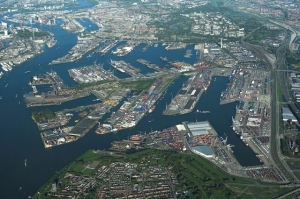


(Posted on 24/02/23)
The war in Ukraine led to unprecedented changes in goods flows last year. At 467.4 million tonnes, total throughput in Rotterdam was almost the same (-0.3%) as in 2021 (468.7 million tonnes) but the underlying figures show that there were major changes.
The dry bulk segment saw an increase of 1.7% to 80.1 million tonnes. The agribulk segment is always strongly influenced by harvest yields in different parts of the world. There were reduced imports from Ukraine last year and high energy costs also caused less processing of agribulk. High energy costs were also a major reason for the lower production in the German steel industry. As a consequence, imports of iron ore declined by 15.5%. The throughput of coal, which in addition to being used in blast furnaces is primarily burned in power plants, rose sharply by 17.9%. Coal was cheaper than natural gas and it also reduces dependence on natural gas (in particular from Russia). In order to burn less natural gas in gas-fired power plants, the Dutch government lifted the production cap that had just been introduced for Dutch coal-fired power plants. Imports of Russian coal have been banned since August. More coal was therefore imported from the USA, South Africa, Australia and Colombia. Biomass throughput rose by 13.7%. Other dry bulk fell by 14.2%. The main causes are stockpiling due to the uncertainty of supply lines, and high prices for the shipping of containers: cargo that can also be transported in bulk, such as industrial minerals and fertilisers, is therefore being transported in this way more often.
Container throughput fell by 5.5% in TEU (-9.6% in tonnes), mainly because container traffic to and from Russia came to a virtual standstill after the invasion of Ukraine. Imports of LNG, mainly from the USA, increased by 63.9% as an alternative to Russian gas. At the same time, coal imports rose by 17.9% as mainly German coal-fired power plants were used more. In line with the sanctions, companies reduced imports of Russian oil, oil products and coal, and succeeded in importing them from elsewhere.
Allard Castelein, CEO of the Port of Rotterdam Authority said, “2022 was an extraordinary year in many ways. The war and the sanctions led to changes in energy flows around the world and high energy prices, and therefore high inflation and the weakening of the economy. The Rotterdam business sector and all service providers were able to respond quickly and effectively. The war has also demonstrated the risks for crucial sectors of strong dependence on one country or a limited number of countries."
"In this respect, the war should work as an incentive to make Dutch and European energy and industry more resilient. That will mean accelerating the production of renewable energy and maintaining strategic industries. However, other factors are involved. They include the lack of progress on tackling nitrogen emissions, high energy prices in Europe, and the speed and scale of the efforts of the government of the United States to rack up the sustainability of its industry. They could place the Netherlands and Europe at a disadvantage. We really need to move up a gear in that respect.”
The Port Authority has had a good 2022 in financial terms. Revenue rose by 6.9% to € 825.7 million. Operating expenses also increased: by 8.3% to € 282.2 million. The operating result before interest, depreciation and taxes (EBITDA) was also higher on balance: by 6.1% to € 543.5 million.
The net result was unchanged at € 247.2 million (2021: € 247.2 million). The Port Authority invested a total of € 257.0 million in the port (2021: € 226.3 million). The dividend proposal for the shareholders (the Municipality of Rotterdam and the Dutch State) increased by € 9.6 million to €?132.3 million (2021: € 122.7 million).
With this year’s Rail Conference “Rail Freight Transport and Seaports”, a joint initiative... Read more
Asian Bulk Logistics (ABL Group) and ICG have jointly announced the successful completion of ABL&rsquo... Read more
Abu Dhabi based AD Ports Group, a leading global enabler of integrated trade, industry and logistics... Read more
The Executive Board of Hamburger Hafen und Logistik AG (HHLA) has appointed Patrick Krawutschke as Managing... Read more
Abu Dhabi based AD Ports Group, a global enabler of integrated trade, transport, industry, and logistics... Read more
This year marks a significant milestone in maritime innovation as Port Hedland, Australia, celebrates... Read more
Associated British Ports (ABP), the UK’s leading port operator, has announced the latest tranche... Read more
During the Investment, Labour, and Trade Promotion Programme in Japan (November 16–22, 2025),... Read more
AD Ports Group subsidiary Khalifa Economic Zones Abu Dhabi - KEZAD Group, the largest operator of integrated... Read more
Abu Dhabi based AD Ports Group, a global enabler of integrated trade, transport, industry, and logistics... Read more